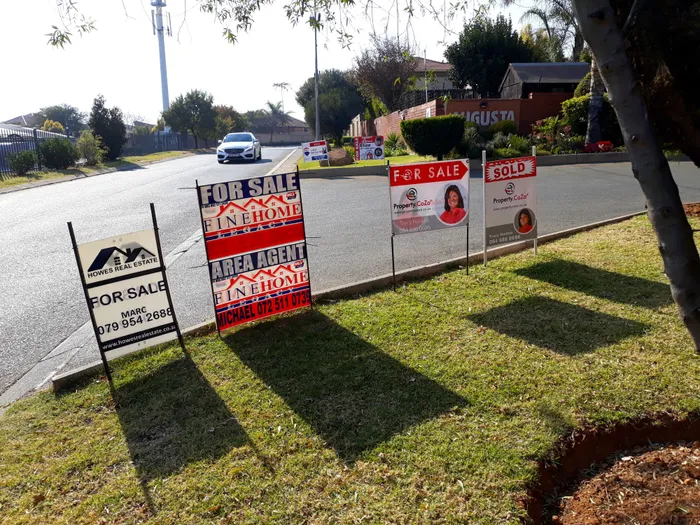Residential property market might tick up next year as interest rates fall

Multiple 'For Sale' signs near the entrance to a complex on the West Rand in this file photo. Picture: Karen Sandison/African News Agency(ANA)
Consumer confidence in the South African property market improved five percentage points to 78% in the second quarter, reflecting slightly higher optimism about future recovery, the Absa Homeowners Sentiment Index showed yesterday.
“Responses started to reflect a slightly higher level of optimism of future recovery, carrying views that property is a secure asset that will create sufficient demand over the longer term,” Absa said.
It said that when respondents were asked whether it was considered an appropriate time to invest in property, the investor customer segment of respondents reflected a 10 percentage point improvement in overall positive sentiment compared to the first quarter.
For the investors who did not consider it an appropriate time to invest in property, fewer respondents were concerned that tenants could not afford to pay rent. There were also more respondents who believed there would be higher demand for property in future, with the sentiment score increasing by nine percent points.
The findings were broadly in line with FNB’s Residential Property Barometer released yesterday.
FNB senior economist Siphamandla Mkhwanazi said feedback from their Estate Agent’s survey suggested 67% of listed properties took three months or more to sell in August, up from 56% in the second quarter, but 50% of interviewed agents expected activity to pick up in the next three months, especially in the affordable market, largely due to seasonal factors.
“Recent macroeconomic data shows a level of resilience in domestic economic activity, despite structural constraints, including acute electricity shortages and railway network inefficiencies,” said Mkhwanazi.
He said surveyed wage expectations also signalled that wage growth could accelerate slightly above inflation next year, which could provide some relief for consumers.
Absa said its index showed that the levels of sentiment provincially increased six percentage points in both KwaZulu-Natal and Gauteng, but declined seven percentage points in the Western Cape.
This finding appears to be in contrast to other recent property indicators that have flagged the Western Cape property market as being relatively more buoyant than other provinces.
Nevertheless, while there are signs of optimism, the FNB House Price Index growth slowed to 0.8% year-on-year in August, down from 1.2% in July, said Mkhwanazi.
“Our internally developed market strength index, derived from our property valuers’ database, continues to show declining levels of demand, while the supply of properties for sale was relatively stable in August … mortgage volumes are now tracking lower than pre-pandemic levels,” he said.
Absa’s overall confidence in the second quarter of 78% was at similar levels to the first quarter of last year.
Both the “Sell” sentiment and the “Buy v Rent” sentiment remained low at the same levels as the first quarter. The “Investing” sentiment improved by two percentage points quarter-on-quarter to 72%.
“The climate of rising living costs and deteriorating affordability continued to influence subdued growth in property market activity (in terms of applications and deeds office transfers) and declining growth in house prices in the second quarter,” Absa said.
Potential homeowners were still cautious in the environment of low economic growth, high inflation and high interest rates, the bank said.
“Based on the current outlook, it is expected that interest rates will start declining in the first quarter of 2024, providing much needed relief for consumers with home loan debt,” Absa said.
BUSINESS REPORT